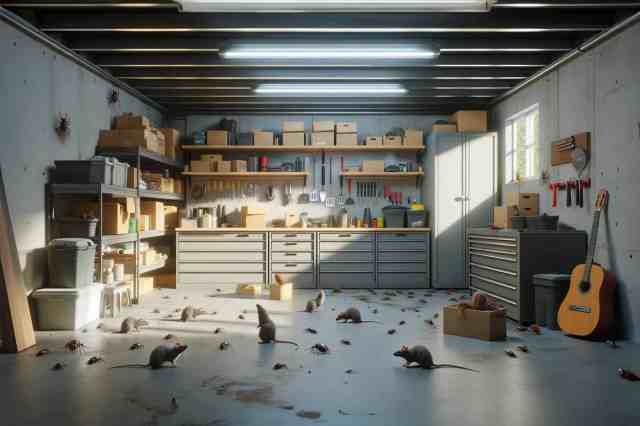Left unchecked, a small rodent population in your home can turn into a full-fledged infestation in a matter of months. Making your garage as inhospitable as possible to rodents and other pests can protect your home’s structural integrity and safeguard your health. It can also ensure that your belongings and structure stays free of gnaw marks, stains, and burrowing damage. Concern from health organizations continues to mount over the use of pesticides and other potentially harmful chemicals as a viable method of pest control. Home owners, however, can rest easy knowing that there are dozens of ways to protect their belongings using natural pest repellant techniques. Read on to learn 11 safe ways to keep rodents and insects out of your garage and off of your mind.
- Seal cracks and crevices. Regardless of their size, cracks in garage floors can invite pests and vermin into your home. Though repairing concrete can seem like a daunting task, it can be relatively easy to do yourself, given the proper tools. You can even finish the floor with a new coat of paint afterward, which can add an extra layer of protection, if it repels stains, water or bugs.
- How to Repair Cracks in A Concrete Garage Floor
- Clean your home and garage regularly. Basic cleaning, organization and upkeep can go a long way in preventing pests from making your garage or shed their new home. Take some time to remove excess dirt and grime from your outdoor structure to see an instant reduction in insects.
- How to Control Pests Safely (PDF)
- Always check your structure for evidence of an existing pest infestation. Inspect corners, crevices, ceilings and even your stored items for urine or droppings. Many times, you can identify what kind of pest has taken up residence in your home just by looking at excrement size and shape.
- Evict and Exile Mice from Your Home
- Research existing pests. If you find that your garage has already been infiltrated by rodents, identify which species they are and find ways that you can repel them. Some types of rats, like the Norway variety, for example, are more likely to be found in certain parts of garages and can respond well to particular control methods.
- Managing Rats and Mice
- Use traps. Active rodent infestations need to be addressed by physically removing them from your garage or shed. While traditional methods like snap traps are common and cheaply available, you can also consider humane trap-and-release solutions to control the rodent population in your structure.
- Control of Mice
- Repack the items in your garage. Place them in non-porous, closed containers with tight-fitting lids. Regular cardboard boxes and cartons inadvertently provide rodents and silverfish with something to gnaw on, and give silverfish a potential breeding ground. Storing clothing in plastic storage bins can effectively protect it from the ruinous habits of cockroaches and moths, as well.
- Clothing Storage Tips
- Remove pests’ potential sources of food and water. Refuse to feed vermin by placing trash cans outside of your garage. Fix leaky pipes and remove standing water, as water can attract mice and insects and provide breeding grounds. If you intend to plant a garden, consider designing it so that it remains a safe distance from your shed or garage.
- Do’s and Don’ts of Pest Control
- Go minimal by decluttering outside. Piles of wood, compost, bricks and lawn furniture can look like the perfect home to mice. Throw away items that you don’t need, and move piles of organic matter away from your garage, as they can be great hiding places for mice until they find a way into your structure.
- 10 Cheap Ways to Pest-Proof Your Home and Garage
- Invest in good trash cans. Find tall, outdoor trash cans with lids that can be closed tightly or locked. Make time to wash their interiors and exteriors every few weeks. If you recycle, find containers that also have tops that can be securely fitted. Move them away from your structure. This can deter insects and other pests from entering your garage after having been attracted to your trash.
- Keeping Pests Away: How to Manage Pests in Your Home (PDF)
- Know what you’re bringing into your garage. Many people shop at garage sales and thrift stores for vintage or economical items; these items, however, may carry with them insects and their droppings. Bedbugs are an especially common offender. When you thoroughly inspect these items, you can protect your garage and the interior of your home, where they will eventually be placed.
- TLC’s 5 Tips for Avoiding Bed Bugs With Secondhand Furniture
- Introduce natural predators. Some common household pets make the best foes for mice. Adopt a cat or dog, like a Maine Coon and Jack Russell that has been bred to hunt down furry vermin. Consider making a space on your property attractive to wild predators of rodents, like owls.
- Rodent-Proof Your Garage


